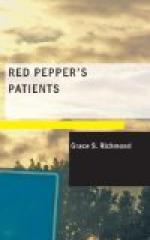“All right, Mr. King,” Aleck responded. “I hope you’re going to have a good time yourself,” he added, “after all the work you’ve done to-day. I was some anxious for fear you’d do too much.”
“No chance, Aleck, with Doctor Burns’s orders what they are. And I didn’t do a thing but stand around and talk with the men. I’m feeling fit as a fiddle now.” And King drove off in haste.
Back at the church he watched with intense satisfaction Miss Anne Linton’s descent of the dusty steps. The September sunshine was hazily bright, the air was warmly caressing, and there were several hours ahead containing such an opportunity as he had not yet had to try at finding out the things he had wanted to know. Not this girl’s circumstances—though he should be interested in that topic—not any affairs of hers which she should not choose to tell him; but the future relationship between herself and him—this was what he must establish upon some sort of a definite basis, if it were possible.
Out through the crowded streets into the suburbs, on beyond these to the open country, the car took its way with as much haste as was compatible with necessary caution. Once on the open road, however, and well away, King paid small attention to covering distance. Indeed, when they had reached a certain wooded district, picturesque after the fashion of the semi-mountainous country of that part of the state, he let his car idle after a fashion most unaccustomed with him, who was usually principally concerned with getting from one place to another with the least possible waste of time.
And now he and Anne Linton were talking as they never had had the chance to talk before, and they were exploring each other’s minds with the zest of those who have many tastes in common. King was confirming that of which he had been convinced by her letters, that she was thoroughly educated, and that she had read and thought along lines which had intensely interested him ever since he had reached the thinking age. To his delight he found that she could hold her own in an argument with as close reasoning, as logical deduction, as keen interpretation, as any young man he knew. And with it all she showed a certain quality of appreciation of his own side of the question which especially pleased him, because it proved that she possessed that most desirable power, rare among those of her sex as he knew them—the ability to hold herself free from undue bias.
Yet she proved herself a very girl none the less by suddenly crying out at sight of certain tall masses of shell-pink flowers growing by the roadside in a shady nook, and by insisting on getting out to pick them for herself.
“It’s so much more fun,” she asserted, “to choose one’s own than to watch a man picking all the poorest blossoms and leaving the very best.”
“Is that what we do?” King asked, his eyes feasting upon the sight of her as she filled her arms with the gay masses, her face eager with her pleasure in them.




